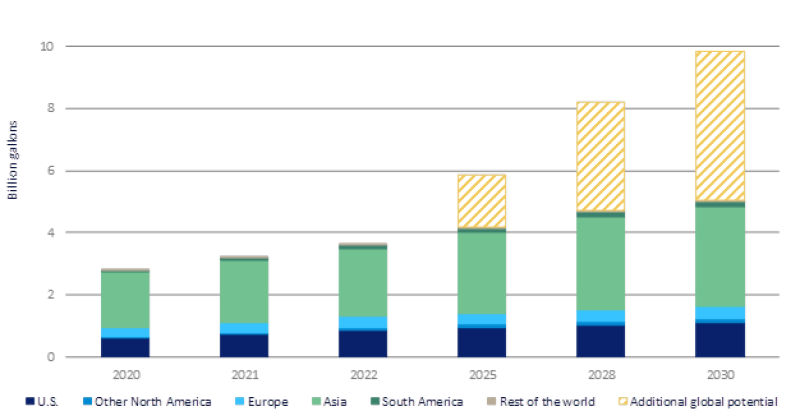The post Trinity Report: Assessment of Health Benefits from Using Biodiesel Fuel for On-Road Transportation Sources in the Bronx appeared first on Clean Fuels Alliance America.
]]>The post Trinity Report: Assessment of Health Benefits from Using Biodiesel Fuel for On-Road Transportation Sources in the Bronx appeared first on Clean Fuels Alliance America.
]]>The post New Assessment Shows Value of Soybean Oil as Low-Carbon Feedstock for Clean Fuels appeared first on Clean Fuels Alliance America.
]]>JEFFERSON CITY, MO – A recent Life Cycle Assessment conducted by Sustainable Solutions Corporation (SSC) for the United Soybean Board (USB) and the National Oilseed Processors Association (NOPA) reveals a significant reduction in the carbon footprint of U.S. Soy throughout its cultivation, harvesting, transportation and processing stages. The assessment highlights a notable 22% decrease in the carbon footprint associated with U.S. production of crude soy oil, which is a key feedstock for U.S. biodiesel, renewable diesel and SAF producers.
Soybean production and oil processing constitute more than 40% of the carbon intensity (CI) score for soy biodiesel. The improvements documented in this report are expected to translate into reductions in CI across the clean fuels industry.
Clean Fuels Alliance America assisted USB and NOPA in ensuring the data collected for processors in the report aligns with data specifications for GREET, so it could be easily integrated into GREET model updates.
“We look forward to working with Argonne National Laboratory through the data quality assessment process to update the GREET model to reflect the latest improvements in the industry,” said Veronica Bradley, Environmental Scientist at Clean Fuels Alliance America.
The Life Cycle Assessment of U.S. Soybeans, Soybean Meal, and Soy Oil report can be found here.
Materials supported by the United Soybean Board, soybean farmers and their checkoffs.
About United Soybean Board (USB): United Soybean Board’s 77 volunteer farmer-leaders work on behalf of all U.S. soybean farmers to achieve maximum value for their soy checkoff investments. These volunteers create value by investing in research, education and promotion with the vision to deliver sustainable soy solutions to every life, every day across the three priority areas of Infrastructure & Connectivity, Health & Nutrition, and Innovation & Technology. As stipulated in the federal Soybean Promotion, Research and Consumer Information Act, the USDA Agricultural Marketing Service has oversight responsibilities for USB and the soy checkoff. For more information on USB, visit unitedsoybean.org.
About National Oilseed Processors Association (NOPA): Founded in 1930, NOPA is the national trade organization located in Washington, DC representing the U.S. soybean, canola, flaxseed, safflower seed, and sunflower seed crushing industries. Our 15 members operate a total of 62 soybean & 5 softseed solvent extraction plants across 21 states. NOPA members produce meal and oil used in human food, animal feed, fuel and for industrial applications. Collectively, NOPA members process 95 percent of all soybeans in the U.S. which accounts to over 2 billion bushels annually. For more information on NOPA, visit nopa.org.
Contact: Heather Buechter, hbuechter@cleanfuels.org.
The post New Assessment Shows Value of Soybean Oil as Low-Carbon Feedstock for Clean Fuels appeared first on Clean Fuels Alliance America.
]]>The post Used Cooking Oil Outlook 2023 appeared first on Clean Fuels Alliance America.
]]>The post Used Cooking Oil Outlook 2023 appeared first on Clean Fuels Alliance America.
]]>The post Valuing Immediate Carbon Reductions appeared first on Clean Fuels Alliance America.
]]>The post Valuing Immediate Carbon Reductions appeared first on Clean Fuels Alliance America.
]]>The post Clean Fuels Industry Benefits appeared first on Clean Fuels Alliance America.
]]>The post Clean Fuels Industry Benefits appeared first on Clean Fuels Alliance America.
]]>The post Trinity Report 2.0: Assessment of Health Benefits from Using Biodiesel as a Transportation Fuel and Residential Heating Oil appeared first on Clean Fuels Alliance America.
]]>The post Trinity Report 2.0: Assessment of Health Benefits from Using Biodiesel as a Transportation Fuel and Residential Heating Oil appeared first on Clean Fuels Alliance America.
]]>The post Trinity Study 1.06: Assessment of Health Benefits from Using Biodiesel as Residential Heating Oil appeared first on Clean Fuels Alliance America.
]]>sources currently fueled by heating oil in select northeastern states.
The post Trinity Study 1.06: Assessment of Health Benefits from Using Biodiesel as Residential Heating Oil appeared first on Clean Fuels Alliance America.
]]>The post Clean Fuels Releases Outlook on Global Supplies of Used Cooking Oil for Biodiesel and Renewable Diesel Production appeared first on Clean Fuels Alliance America.
]]>“Growing demand for better, cleaner fuels like biodiesel, renewable diesel and SAF is creating a tremendous opportunity to develop additional supplies of low-carbon fats and oils, including used cooking oil and surplus crop oils,” said Donnell Rehagen, CEO of Clean Fuels Alliance America. “Our industry envisions sustainably producing 6 billion gallons of clean fuels by 2030, and this report identifies crucial additional feedstocks. Our vision supports national goals to decarbonize aviation and other heavy-duty transportation sectors.”
Access the report on cleanfuels.org/sustainable-impact/.
Forecast global UCO supplies to 2030

The report indicates that the United States has the most well-developed UCO collection system, due to long-standing practices for its use and disposal. In 2022, the U.S. supply reached 850 million gallons. Increasing biodiesel and renewable diesel production is incentivizing domestic use of that supply – curbing recent export trends. The report identifies additional room for growth in U.S. collection to 1.1 billion gallons.
Global UCO trade reached 1.3 billion gallons in 2022. The majority of collected UCO supplies moved from Asia to Europe. The report identifies the potential to increase UCO collection in Asia, South America and Europe to meet global demand for biodiesel, renewable diesel and SAF. Additional collection could be achieved in those countries with U.S.-style collection practices.
Contact: Paul Winters, 202-737-8803, pwinters@cleanfuels.org.
Materials supported by United Soybean Board, soybean farmers and their checkoffs.
The post Clean Fuels Releases Outlook on Global Supplies of Used Cooking Oil for Biodiesel and Renewable Diesel Production appeared first on Clean Fuels Alliance America.
]]>The post Accurately Accounting for SAF Carbon Emission Benefits appeared first on Clean Fuels Alliance America.
]]>Published in SAF Magazine Issue 2
Scientists across the world agree that to avoid the most catastrophic impacts of climate change, we must peak annual global greenhouse gas emissions before 2025 and reduce them by 43% by 2030. We also know that until net-zero emissions can be achieved, every ton of CO2 emitted to our atmosphere adds to the global warming potential, contributing to the severe weather events we’ve experienced in recent years. If a company delays reducing its annual emissions by just one ton of carbon for five years, it will need to reduce annual emissions by over 13 tons to make up for lost time.
The fundamental science underlying this time value of carbon concept is well understood. That’s one reason major transportation sector players, including commercial airlines and air freight and logistics companies, have publicly committed to reducing their annual emissions or even to achieving net-zero corporate emissions. The clean fuels industry stands ready to support these corporate commitments.
However, carbon accounting methods are still being developed for companies to inventory the impacts of carbon reduction measures like fuel switching, and track their progress to their net-zero goals. The Greenhouse Gas Protocol began revising its Corporate Standard in 2022, but recently pushed back the release of its Land Sector and Removals Guidance to mid-2024. The Science-Based Targets Initiative correspondingly changed the finalization of its Forest, Land and Agriculture Guidance.
These standards and guidance documents are part of a larger package of corporate greenhouse gas quantification principles companies are meant to rely on to prove to stakeholders they are on track to decarbonize and mitigate climate risks. But some draft versions and proposed changes are untenable for the corporate world, especially in consideration of our urgent need to increasingly remove carbon from the atmosphere.
Clean fuel producers, including producers of sustainable aviation fuel, know their fuels are less carbon intensive than their petroleum-derived counterparts, helping to avoid that extra ton of carbon. But, quantifying that carbon intensity, and capturing all the carbon in the results, depends on the programmatic framework, whether it is California’s Low Carbon Fuel Standard, the International Civil Aviation Organization’s Carbon Offsetting and Reduction Scheme for International Aviation, or something else.
SAF producers aim to provide their customers with the right data on the well-to-wheels emissions of their fuels. But SAF producer knowledge is framed around their product, while their customers’ ledgers are focused on their actions and account for the element of time.
Clean Fuels Alliance America has begun the process of reconciling these corporate standards and guidances, including the sustainability certification schemes for CORSIA-eligible fuels and important market-based mechanisms like book-and-claim that socialize SAF premiums while attributing environmental benefits to supply chain partners. Our hope is to guide this clean fuel-focused community to a more streamlined process of quantifying and accurately accounting for the high-quality carbon emissions benefits that SAF offers. As a trade association, we represent the entire supply chain from feedstock production to fuel production and distribution. We are particularly well-positioned to support our fuel producers as they work with their customers to mitigate climate change.
We are one pellet in a silver buckshot to decarbonize aviation as well as other transportation sectors, but we aim to do so in a scientifically robust and practically implementable fashion. And we hope you’ll join us in counting and tracking all the carbon to eke out every incremental benefit SAF has to offer.
The post Accurately Accounting for SAF Carbon Emission Benefits appeared first on Clean Fuels Alliance America.
]]>The post Clean Fuels Hires Fuel Economist Jonathan Martin appeared first on Clean Fuels Alliance America.
]]>
September 19, 2022
JEFFERSON CITY, MO – Clean Fuels Alliance America has appointed Jonathan Martin of Ottawa Hills, Ohio, as its first Director of Economic and Market Analytics.
Martin, most recently an economist with Marathon Petroleum Co., brings ten years of experience in oil and gas corporate economics to this newly created role. He will be based in Ohio.
Well-versed in synthesizing and analyzing data, Martin is strategically positioned to support Clean Fuels in economic analysis of planning and policy decisions. Martin has a bachelor’s degree in chemical engineering from Rose-Hulman Institute of Technology, Terre Haute, Indiana.
“As the diversity of clean fuels grows, we are dedicating additional resources to better predict market trends for our organization and our members,” said Donnell Rehagen, CEO of Clean Fuels. “Jonathan’s vast experience in market research, forecasting and data analytics will better position our Clean Fuels to do just that.”
“I am excited to be joining Clean Fuels and the renewables industry,” said Martin. I hope to apply my background in energy economics and analytics to help our members and the industry stay abreast of shifting market trends and potential growth opportunities from new LCFS markets to carbon reduction targets within the broader energy market.”
The post Clean Fuels Hires Fuel Economist Jonathan Martin appeared first on Clean Fuels Alliance America.
]]>